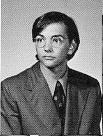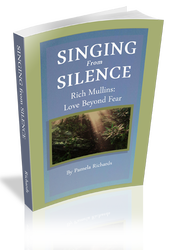
However, neither description fits.
Pamela Richard’s memoir account of Rich’s life, Singing from Silence, is an excellent work befitting the type of description this reviewer believes Rich Mullins would want as his legacy. Ms. Richards close friendship and inspirational talents helped Rich open the door to his heart and his true dreams like he would to no other.
Meeting at a Bible College in Cincinnati, Pamela and Rich spent many hours, days and years together weaving a tapestry of artwork and music into an inspirational collection of emotions, songs and personal gifts to one another. Singing From Silence provides an unusually provocative behind the scenes look into what inspired many of the songs Rich Mullins composed. It might just as aptly been named the stories behind his songs.
The raw emotional honesty used in the book attests to the difficulties that both Richard and Pamela had in
verbally articulating their beliefs, loves, sorrows and triumphs. This hallmark trait gives her book believability and the ability for others from various backgrounds to relate to the intricate threads that become our lives as
humans.
Both Pamela and Richard had a unique way of exploring the three major love languages of life. While both of them experienced it differently from each other and differently from what most people might expect, each moved easily through the channels of agape, eros and familial love to be the strength the other one needed at any given time. This is what made the relationship between these two so unique.
Hammer dulcimists everywhere will thank Ms. Richards for introducing Richard to the santur. As a naturally gifted musician, an instrument that relied heavily on arpeggios was a natural for him. National Hammer Dulcimer Champion Ted Yoder was heavily inspired by Richard’s playing as is this reviewer. Without realizing it, Richard gave many more individuals a gift simply by being an ambassador of this instrument.
Through all of this, Pamela and Richard learned how to love and accept each other in their quest to love and serve God. One of Richard’s strongest wishes was not to be remembered as an entertainer, but rather as an imperfect human being just like all of us who simply used a musical talent in search of his answers of/from a
loving God. Richard found a “Love that Knows No Bounds.” He did it with the courageous and persistent efforts of a loving and caring friend and confidante, Pamela Richards.
The book is an easy read with engaging anecdotes and will likely be a joy to anyone who reads it. It is especially interesting to those who love the legacy left behind by an Indiana ragamuffin who coincidentally achieved fame as an entertainer and composer.
Richard J Blumberg


 RSS Feed
RSS Feed
